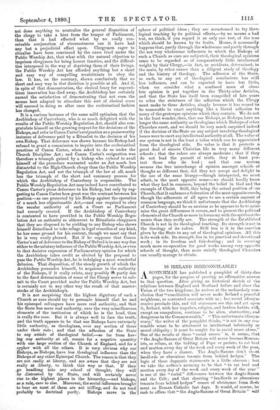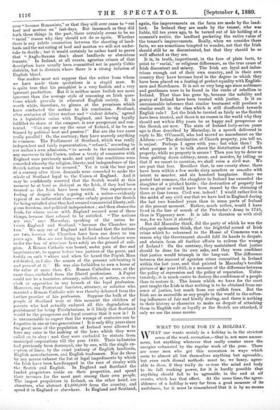IS IRELAND IRRECONCILABLE I
ASCOTCHMAN has published a pamphlet of thirty-five pages, for the purpose of proving an affirmative answer to that question. After giving an historical sketch of the relations between England and Scotland before and since the Union of the two kingdoms, he arrives at the melancholy con- clusion that "conciliation will never make Ireland a peaceful neighbour, or contented associate with us ; her social idiosyn- oracles preclude this, and till statesmen see this and act upon it, Ireland, with her impulses, religion, and lawless habits, will, except on compulsion, continue to be alien, obstructive, and dangerous to the Commonwealth." " This unfortunate idiosyn- cracy," the writer of the pamphlet thinks, "is not in any rea- sonable sense to be attributed to intellectual inferiority or moral obliquity ; it must be sought for in racial cause alone." One of the results of these "racial causes" is, it seems, that " the Anglo-Saxons of Great Britain will never become Roman- ists, or refuse, at the bidding of Pope or prelate, to eat beef and mutton every day of the week and every week of the year, when they have a chance. The Anglo-Saxons don't shoot landlords or obnoxious tenants from behind hedges." The logic of these dogmatic statements is a little obscure ; but we take the author's meaning to be that " to eat beef and .mutton every day of the week and every week of' the year" is one of the "racial" differences between the Anglo-Saxon and the Celt ; and that shooting "landlords or obnoxious tenants from behind hedges" comes of abstinence from flesh meat on Roman Catholic fast days. It would, of course, be rash to affirm that " the Anglo-Saxons of Great Britain " will
ever " become Romanists," or that they will ever cease to "eat beef and mutton on" fast-days. But inasmuch as they did both these things in the past, there certainly seems to be no " racial " reason why they should not do so again. Whether there is any subtle connection between the shooting of land- lords and the not eating of beef and mutton we will not under- take to decide; but it would certainly be rather hard to prove that " Anglo-Saxons don't shoot landlords or obnoxious tenants." In Ireland, at all events, agrarian crimes of that description have usually been committed not in purely Celtic districts, but in districts where there is a strong infusion of English blood. Our readers must not suppose that the writer from whom we have made these quotations is a stupid man. It is quite true that his pamphlet is a very foolish and a very ignorant production. But it is neither more foolish nor more ignorant than the average style of reasoning on Irish ques- tions which prevails in educated English society. It is worth while, therefore, to glance at the premisses which have conducted the author to his conclusion. Scotland, after centuries of bitter warfare and " violent debate," agreed to a legislative union with England, and having loyally fulfilled its share of the compact, is now prosperous and con- tented. " Can any one say the same of Ireland, if he be un- biassed by political heat and passion ?" But are the two cases really parallel? On the contrary, they have scarcely anything in c)mmon. The Parliament of Scotland, which was really independent and fairly representative, "refused," according to our author's own admission, " to accede to the nomination of any successor to the Crown, unless a treaty of commerce with England were previously made, and until due conditions were conceded whereby the religion, liberty, and independence of the Scotch nation would be secured." Yet it took the best part of a century after these demands were conceded to make the whole of Scotland loyal to the Crown of England. And it may be confidently asserted that the Scotch would at this moment be at least as disloyal as the Irish, if they had been treated as the lash have been treated. One experiences a feeling of despair when arguing with a writer—evidently typical of an influential class—who calmly praises the Scotch for being satisfied after they bad secured commercial liberty, reli- gious freedom, and political independence ; and then abuses the Irish, for whom union with England secured none of these things, because they refused to be satisfied. "The nations are one," says Macaulay, speaking of the union be- t weep England and Scotland, " because the Churches are two." We may sac of England and Ireland that the nations nre two, because the Churches have been one down to ten years ago. Men are now living in Ireland whose fathers were under the ban of atrocious laws solely on the ground of reli- gion. A Roman Catholic was bound, under pain of fine and imprisonment, to appear before two justices of the peace, and testify on oath " where and when he heard the Popish Mass celebrated, and also the names of the persons celebrating it and present at it." He was also forbidden to own a horse of the value of more than £5. Roman Catholics were, at the same time, exclhded from the liberal professions. A Papist could not be a barrister, attorney, solicitor, or notary, or even clerk or apprentice in any branch of the legal profession. Moreover, any Protestant barrister, attorney, or solicitor who married a Roman Catholic wife was thereby debarred from the farther practice of his profession. Suppose the bulk of the people of Scotland were at this moment the children of parents who had actually endured all this degradation in punishment for being Presbyterians, is it likely that Scotland would be the prosperous and loyal country that it now is ? It is unreasonable to expect that the wrongs of centuries can be forgotten in one or two generations ? It is only fifty years since the great mass of the population of Ireland were allowed to have any voice in the making of the laws which they were called on to obey ; and they were excluded by statute from municipal corporations till the year 1840. Their industries had previously been destroyed, one by one, with the single ex- ception of linen, by the cruel jealousy of English landlords, English manufacturers, and English tradesmen. Nor do these by any means exhaust the list of legal impediments by which the Irish have been handicapped in the race of rivalry with the Scotch and English. In England and Scotland the landed proprietors reside on their properties, and spend their incomes for the most part among their own people. The largest proprietors in Ireland, on the other hand, are absentees, who abstract £4,000,000 from the country, and spend it in England or elsewhere. In England and Scotland, again, the improvements on the farm are made by the land- lord. In Ireland they are made by the tenant, who was liable, till ten years ago, to be turned out of his holding at a moment's notice, the landlord pocketing the entire value of the tenant's improvements. Really, when we consider these facts, we are sometimes tempted to wonder, not that the Irish should still be so discontented, but that they should be so well affected as they are.
It is, in truth, impertinent, in the face of plain facts, to point to " racial," or religious differences, as the true cause of Irish discontent and misery. The Irish are loyal and indus- trious enough out of their own country, and in their own country they have become loyal in the degree in which they have been placed on a footing of perfect equality with English- men and Scotchmen. It is not so very long ago since noblemen and gentlemen were io be found in the ranks of rebellion in Ireland. That time has gone by, because the nobility and gentry of Ireland have been treated with justice. Is it an unreasonable inference that similar treatment will produce a similar result in the class which is still disaffected towards English rule f Let the Irish be treated as fairly as the Scotch have been treated, and there is no reason in the world why they should not within fifty years be as happy and prosperous as the Scotch are now. The state of Ireland forty-seven years ago is thus described by Macaulay, in a speech delivered in reply to Mr. O'Connell, who had moved an amendment on the Address :—" The distribution of Church property, you tell us, is unjust. Perhaps I agree with you ; but what then ? To what purpose is it to talk about the distribution of Church property, while no property is secure ? Then you try to deter us from putting down robbery, arson, and murder, by telling us that if we resort to coercion, we shall raise a civil war. We are past that fear. Recollect that, in one county alone, there have been within a few weeks sixty murders or assaults with intent to murder, and six hundred burglaries. Since we parted last summer, the slaughter in Ireland has exceeded the slaughter of a pitched battle ; the destruction of property has been as great as would have been caused by the storming of three or four towns. Civil war, indeed ! I would rather live in the midst of any civil war that we have had in England during the last two hundred years than in some parts of Ireland at the present moment. Rather, much rather, would I have lived in the line of march of the Pretender's Army in 1745, than in Tipperary now. It is idle to threaten us with civil war, for we have it aheady."
But did Macaulay think, did the party of which he was the eloquent spokesman think, that the frightful record of Irish crime which he rehearsed to the House of Commons was a reason why the Government should fold its hands in despair, and abstain from all further efforts to redress the wrongs of Ireland ? On the contrary, they maintained that justice should be done for its own sake, and they were confident that justice would triumph in the long-run. The difference between the amount of agrarian crime committed in Ireland within the last year, and that painted in Macaulay's terrible picture of tie year 1833, is a measure of the difference between the policy of repression and the policy of reparation. Unfor- tunately, it is much easier to destroy the confidence of a people than to restore it. The lesson which we have for the most part taught the Irish is that nothing is to be obtained from our sense of justice, but much from our selfish fears. But the Irish are as accessible as any people in the world to the soften- ing influences of fair and kindly dealing, and there is nothing in their history or character to make us despair of attaching them to English rule as loyally as the Scotch are attached, if only we use the same means.



































 Previous page
Previous page